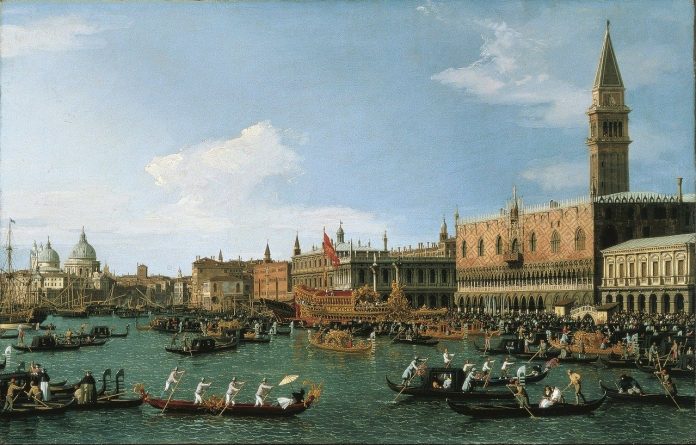“The Haunted Hotel” by Wilkie Collins: “A Mystery of Modern Venice” – A Gothic Masterpiece
Introduction of “A Mystery of Modern Venice”
“The Haunted Hotel” by Wilkie Collins, a close friend of Charles Dickens who is often celebrated for his contribution to the genre of sensation fiction in the Victorian era, stands out as a captivating blend of gothic horror and mystery among his numerous works. First serialised in Belgravia magazine in 1878 and subsequently published as a novel, this work showcases Collins’s knack for weaving suspenseful narratives with psychological depth.
Plot Overview of “The Haunted Hotel” by Wilkie Collins
“The Haunted Hotel” begins with an eerie premise that sets the tone for the whole narrative. Lord Montbarry, a wealthy English nobleman, abruptly breaks off his engagement to the virtuous Agnes Lockwood and marries the enigmatic Countess Narona. The newlyweds travel to Venice, where they stay at a decaying palace, which becomes central to the unfolding mystery. The narrative takes a dark turn when Lord Montbarry dies under mysterious circumstances, and his courier, Ferrari, goes missing. The Countess inherits a significant sum of money, arousing suspicion and intrigue. Agnes Lockwood, driven by unresolved feelings and curiosity, becomes entangled in the mystery when she visits the same Venetian palace, which has now been converted into a hotel.
Themes and Style
Collins masterfully combines elements of gothic fiction—such as the decaying Venetian palace, spectral appearances, and a pervasive sense of doom—with the hallmarks of a detective story. The atmospheric setting of Venice, with its labyrinthine canals and shadowy alleys, enhances the novel’s eerie ambience. One of the central themes in “The Haunted Hotel” is the exploration of human psychology, particularly the manifestation of guilt and fear. Collins delves into the minds of his characters, especially Countess Narona, whose psychological torment becomes a pivotal aspect of the plot. Her visions and the sense of impending doom contribute to the novel’s supernatural undertone.
Characters of “The Haunted Hotel” by Wilkie Collins
Countess Narona: Perhaps the most complex character, she is both a villain and a victim. Her marriage to Lord Montbarry and subsequent behaviour drive much of the plot’s suspense. Collins portrays her as a distraught woman haunted by her actions and the oppressive atmosphere of the hotel.
Lord Montbarry: His mysterious death and the circumstances surrounding it form the crux of the mystery. Though he is a central figure, his character is more defined through the reactions and investigations of others.
Agnes Lockwood: Agnes, representing innocence and moral fortitude, is involved in the mystery and is driven by her love for Montbarry and her innate sense of justice. Her determination to uncover the truth adds a layer of emotional depth to the narrative.
Henry Westwick: Montbarry’s brother, who later becomes romantically interested in Agnes. He plays an essential role in the investigation, highlighting the rational aspect of the story.
Symbolism and Imagery
Collins uses the decaying Venetian palace as a potent symbol of corruption and decay. The palace, once grand and opulent, mirrors the moral disintegration of its inhabitants. The damp, dark corridors and hidden rooms serve as metaphors for the secrets and lies that drive the plot. The ghostly apparitions and eerie occurrences within the hotel are not just elements of supernatural intrigue but also representations of the character’s internal struggles. The haunting is as much a psychological phenomenon as it is a physical one, reflecting the characters’ fears and guilt.
Writing Techniques in “The Haunted Hotel” by Wilkie Collins
Collins employs a variety of writing techniques to heighten the novel’s suspense and complexity. His use of multiple perspectives allows readers to piece together the mystery from different angles. The epistolary format in certain sections adds authenticity and immediacy, making the narrative more immersive. The pacing of “The Haunted Hotel” is deliberate, building tension gradually through meticulous descriptions and carefully timed revelations. Collins’s attention to detail in setting and character behaviour enhances the reader’s engagement, drawing them deeper into the sinister world he creates.
Historical Context
“The Haunted Hotel” was written during a time when Victorian society was fascinated by the supernatural and the mysterious. The late 19th century saw a surge in spiritualism and a growing interest in ghost stories, which provided fertile ground for Collins’s novel. The public’s preoccupation with séances, phantoms, and unexplained phenomena added to the allure of Collins’s story, making it a timely piece that resonated with contemporary readers’ tastes and anxieties.
Exploration of Gender Roles in “The Haunted Hotel” by Wilkie Collins
Collins’s depiction of his female characters, particularly the contrast between Agnes Lockwood and Countess Narona, offers a subtle critique of Victorian gender roles. Agnes embodies the idealised Victorian woman—pure, moral, and steadfast—while the Countess represents the dangerous and enigmatic foreign woman, often viewed with suspicion. This juxtaposition not only heightens the novel’s tension but also reflects the period’s anxieties about women’s changing roles in society.
Psychological Realism
One of the novel’s strengths is its psychological realism. Collins delves deep into the minds of his characters, particularly the tormented Countess Narona. Her inner turmoil and visions of doom are portrayed with such intensity that they blur the lines between sanity and madness. This focus on psychological depth makes the supernatural elements of the story feel more credible and chilling, as they stem from the characters’ inner fears and guilt.
Social Commentary in “The Haunted Hotel” by Wilkie Collins
Through its characters and plot, “The Haunted Hotel” subtly critiques the social and moral values of the Victorian era. The novel explores themes of greed, betrayal, and the consequences of immoral actions. Lord Montbarry’s pursuit of wealth and status at the expense of personal relationships ultimately leads to his downfall, acting as a warning about the perils of materialism and moral corruption.
Influence on Gothic Literature
“The Haunted Hotel” has had a lasting impact on the genre of gothic literature. Collins’s ability to blend gothic elements with a detective story set a precedent for future writers. His use of an atmospheric setting, combined with psychological horror and a tightly woven plot, has influenced numerous authors in both the gothic and mystery genres. The novel’s enduring popularity highlights its compelling narrative, atmospheric depth, and significance in the literary canon.
Personal Struggles and Creativity in “The Haunted Hotel” by Wilkie Collins
Wilkie Collins wrote “The Haunted Hotel” during a period of personal struggle, dealing with health issues and dependency on laudanum, a typical Victorian painkiller. These personal challenges may have influenced the darker themes and the intense psychological depth found in the novel. Collins’s ability to channel his own experiences and anxieties into his writing adds a layer of authenticity and poignancy to the narrative, enriching the reader’s experience.
Critical Reception
While “The Haunted Hotel” may not be as universally acclaimed as Collins’s earlier works like “The Woman in White” or “The Moonstone,” it has been praised for its atmospheric tension and psychological complexity. Critics have noted Collins’s ability to maintain suspense and craft a compelling mystery without relying heavily on supernatural explanations, though the eerie elements undeniably enrich the story.
Adaptations and Influence of “The Haunted Hotel” by Wilkie Collins
“The Haunted Hotel” has inspired various adaptations in different media, including radio dramas, stage plays, and even film adaptations. These adaptations often emphasise the novel’s gothic elements, capitalising on its atmospheric setting and psychological tension. The novel’s influence extends beyond direct adaptations. Its themes and stylistic elements can be seen in later works of horror and mystery. Modern writers of gothic fiction and psychological thrillers often draw on Collins’s techniques to create suspense and explore the darker aspects of human nature.
Legacy
“The Haunted Hotel” remains a fascinating read for fans of gothic literature and Victorian mysteries. Collins’s skilful storytelling and his exploration of themes like guilt, fear, and the supernatural ensure that the novel continues to captivate modern audiences. Its influence can be seen in later works of horror and mystery, cementing Wilkie Collins’s legacy as a pioneer in the genre.
Conclusion
In conclusion, “The Haunted Hotel” is a commendable showcase of Wilkie Collins’s literary prowess. It exemplifies his ability to merge gothic horror with the detective narrative, creating a work that is both thrilling and thought-provoking. As readers navigate the haunting corridors of the Venetian hotel, they are drawn into a world where every shadow holds a secret and every corner whispers of the past. The novel’s enduring appeal lies in its masterful blend of atmosphere, character study, and psychological depth. Collins not only tells a compelling story but also invites readers to explore the darker recesses of the human mind. “The Haunted Hotel” is a work that continues to allure, offering a rich maze of mystery and horror that remains as engaging today as it was over a century ago.





